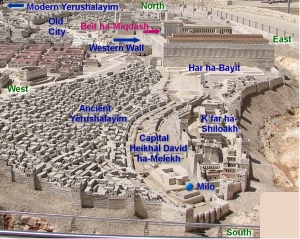
 |

 |
By their mutual arrangement, ShᵊlomꞋoh Bën-Dâ•widꞋ in-lawed![]() with Par•ohꞋ Ah-kheper-
with Par•ohꞋ Ah-kheper-Ra Setep-en-Amun, marrying one of the Par•ohꞋ 's daughters, whom he brought to Ir Dâ•widꞋ until he finished [1] his baꞋyit, [2] the Beit é‑‑ä and [3] the wall around Yᵊru•shâ•laꞋyim.
Demurring that the am sacrificed on bâm•otꞋ (because there was yet no BaꞋyit constructed to SheimꞋ é‑‑ä).
 |
Now ShᵊlomꞋoh loved é‑‑ä, walking in the khuq•otꞋ of Dâ•widꞋ, his father – demurring that he sacrificed on bâm•otꞋ. One day, the mëlꞋëkh went to GivᵊōnꞋ to sacrifice there because that was the leading bâm•âhꞋ. ShᵊlomꞋoh sacrificed 1,000 ōl•ōtꞋ on that mi•zᵊbeiꞋakh.
While in GivᵊōnꞋ, ShᵊlomꞋoh dreamed that é‑‑ä appeared to him, saying, "What would you like me to grant you?"
So ShᵊlomꞋoh responded, "Your worker is amidst Your am, whom You have chosen, too many to count. Allow Your worker an empathetic![]() heart to judge-mi•shᵊpâtꞋ of Your am; to understand between good and wrong. For what man can judge-mi•shᵊpâtꞋ of this am kâ•veidꞋ?"
heart to judge-mi•shᵊpâtꞋ of Your am; to understand between good and wrong. For what man can judge-mi•shᵊpâtꞋ of this am kâ•veidꞋ?"
This was a good thing in the Eyes of é‑‑ä so Ël•oh•imꞋ answered his tᵊphil•âhꞋ.![]()
When ShᵊlomꞋoh woke up he returned to Yᵊru•shâ•laꞋyim and stood in front of the •ronꞋ Bᵊrit A•don•âiꞋ, offering-up ōl•ōtꞋ and making shᵊlâm•imꞋ, culminating in a banquet for all of his workers.
One day, as ShᵊlomꞋoh ha-MëlꞋëkh was convening the Beit Din, two prostitutes brought their cases before him. One of the women explained, "Please a•don•iꞋ, I and this woman live in the same house and we each gave birth to a baby boy; first me, then, 3 days later, she also gave birth to a baby boy. We were together at home. There was no strange man in the house; just the two of us. During the night, she rolled over on her son and inadvertently smothered her baby boy. In the middle of the night, while I slept, she got up and switched sons with me. When I got up in the pre-dawn darkness to nurse my baby, it was dead. But, after daybreak when I could see better, I discovered it wasn't my baby, the baby to whom I gave birth."
"No," the other prostitute argued. "The living boy is my baby! The dead baby is hers." So, each prostitute argued that the living boy was her own baby while the dead baby belonged to the other.
"Get a sword for me!" demanded the mëlꞋëkh. So they brought a sword to him. Then the mëlꞋëkh ordered, "Slice the living boy in two. Give half to one and the other half to the other!"
"Please no, a•don•iꞋ!" wailed the woman whose child was the live boy, for she was overcome with anguish for her son. "Give her the living boy," she pleaded, "but don't kill the child." But the other woman agreed with the mëlꞋëkh: "If I can't have the boy then neither should she. Go ahead, slice him in two!"
So the mëlꞋëkh ordered, "Don't harm the baby! Award the boy to the woman who was willing to give-up the child rather than allow him to be killed! She is the boy's mother."
Word of the mëlꞋëkh's wise mi•shᵊpâtꞋ spread throughout all of Yi•sᵊr•â•eilꞋ; and everyone was in awe of the mëlꞋëkh because they saw that the wisdom of ël•oh•imꞋ was within him to do mi•shᵊpâtꞋ.
So ShᵊlomꞋoh ha-MëlꞋëkh was mëlꞋëkh over all Yi•sᵊr•â•eilꞋ.

Optional parental preparation:
To "in-law" (verb) – The original principle meaning of marriage has been lost, and this related verb lost with it.
"Though marriage has ancient roots, until recently love had little to do with it.
"What marriage had in common was that it really was not about the relationship between the man and the woman," said Stephanie Coontz, the author of "Marriage, a History: How Love Conquered Marriage," (Penguin Books, 2006). "It was a way of getting in-laws, of making alliances and expanding the family labor force."
"But as family plots of land gave way to market economies and Kings ceded power to democracies, the notion of marriage transformed." (www.livescience.com/37777-history-of-marriage.html; 2016.11.13)
The "Silver Par•ohꞋ" – Silver, at that time in ancient Egypt, was more valuable than gold. Thus, contrary to the modern impression of gold Par•ohꞋs, this was the #1, single-most important of all Par•ohꞋs in history (corrupted to Psusennes Sr.; see my Chronology of the Tanakh, from the "Big ðÈèÈä" Live-LinkT![]() )
)![]()
 350x233.jpg) |
 332x450.jpg) |
| The Gold Death Mask of Par•ohꞋ Ah-kheper- |
Here is how you can always receive a positive answer to your tᵊphil•otꞋ: ensure your tᵊphil•âhꞋ is compatible with, meshes with and furthers the Principles of Tor•âhꞋ – logical (scientific) Ha•lâkh•âhꞋ. Further details: Effective Prayer Checklist, The Nᵊtzârim Reconstruction of Hebrew Matitᵊyâhu (NHM, in English)![]() note 21.22.2
note 21.22.2![]()
Questions you might anticipate that your child might raise and be prepared to discuss:
What does wise mean? What is wisdom? Like a "wise guy"?
What is a prostitute?
What does it mean to demur?
What was a sacrifice? (comparable to a court-ordered fine today)
What does empathetic mean?
How can you get your tᵊphil•otꞋ answered?
![]()
 |
 |